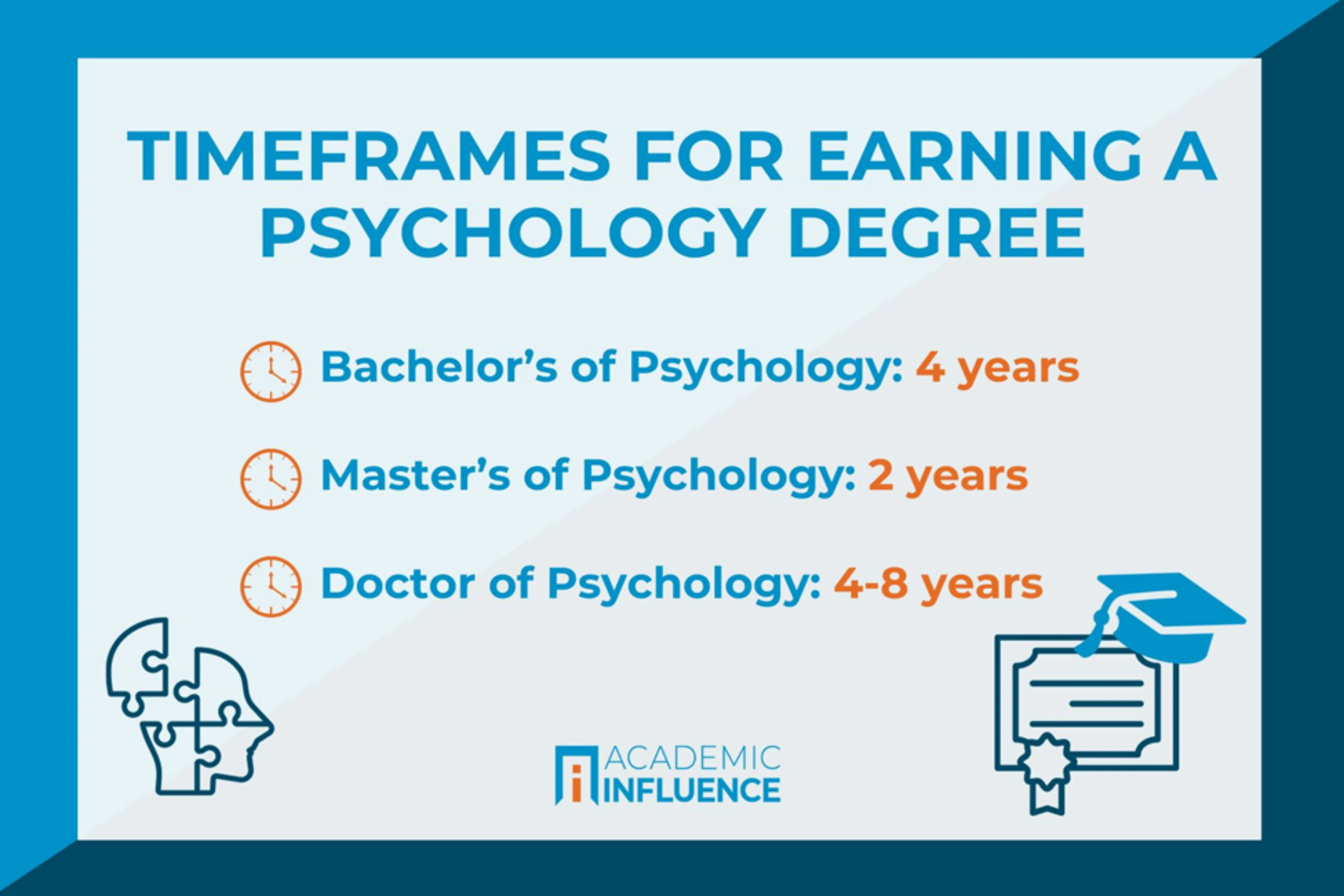How Long Does It Take To Get a Psychology Degree?

Key Takeaways
- It takes four to five years of study as a full time student to get a bachelor’s degree in psychology.
- After earning a bachelor’s degree in psychology, it takes an additional two to three years to earn a master’s degree.
- A doctorate degree in psychology requires four to seven years of intensive research and practical experience.
With over 126,000 students graduating with bachelor’s degrees in psychology a few years ago, it’s no wonder many prospective psychology majors wonder, “how long does it take to earn a psychology degree?”
Mapping out the timeline and course requirements for an undergraduate or graduate program is key to navigating the path to launching or advancing a psychology career. Getting clear answers on the commitment can help remove some of the uncertainty holding you back from taking those first psychology courses.
How long does it take to get a psychology degree?
To get a bachelor’s degree in psychology, it takes four to five years as a full time student. If you decide to get a master’s or doctorate to further your psychology career, you could be studying and researching for an additional two to eight years.
Did you know that there are accelerated online master’s degree in psychology programs that allow students to graduate in an faster-than-usual amount of time?
If you are interested in continuing your education in psychology to eventually become a psychiatrist, there is a clear and defined process for students to work towards a career in psychiatry.

Standard Pathways to a Degree in Psychology
Earning a psychology degree involves traversing through standard pathways encompassing several academic milestones. The initial step is pursuing a bachelor’s degree, a four-year commitment when pursued full-time. Students dive into foundational psychology courses during this phase, building a comprehensive understanding of the field.
Upon completion of the bachelor’s degree, aspiring psychologists often opt for a master’s degree, an additional two to three years of focused study. This stage, covering five to eight semesters, allows for deeper exploration and specialization within the field.
A doctorate degree is another milestone for ambitious students. Doctoral programs, whether a Ph.D. or Psy.D., require four to seven years of intensive research and practical experience. This phase culminates in developing expertise and often involves a dissertation project.
Back to TopFactors Influencing How Long It Takes to Get a Psychology Degree
A psychology degree’s completion duration might vary greatly depending on several variables, including:
- Time commitment to the educational program
- Internships and additional experience
- Type of educational program
Getting Accepted Into Colleges and Programs
Before starting the clock on the amount of time it takes to get a psych degree, you first need to be accepted into a college, and often, a specific program. If you go on to get your master’s or doctorate, the process can become even more selective.
According to James Barham, PhD, the Vice President and Academic Editor at Academic Influence, “Gaining admission into master’s and PhD psychology programs is highly selective nowadays, with acceptance rates often less than 20%. Applicants who stand out have strong academic credentials plus substantial research, clinical, or volunteer experiences that align with the program’s focus.”
Part-Time vs. Full-Time Enrollment
Studying part-time allows people to manage their personal and academic obligations, which may result in it taking longer to earn your degree. On the other hand, full-time enrollment speeds up the process and allows you to complete your schooling sooner.
Course Availability and Personal Circumstances
Course availability and personal circumstances further influence the length of your academic journey. Limited course offerings or scheduling conflicts may impede progress, elongating the time required to fulfill degree requirements. If you’re going to a college or university where the major is impacted, this can also prolong the process.
Internships and Practical Experience Requirements
Internships and practical experience requirements are integral to psychology programs, particularly for aspiring clinical psychologists. These hands-on experiences contribute to skill development and are often mandatory for licensure.
Program Type
Pursuing an associate degree typically takes less time than obtaining a doctoral degree, which is often a prerequisite for becoming a licensed psychologist. Specialized fields like school psychology or clinical and counseling psychology may have distinct program requirements, affecting the overall time frame.

Back to Top
Challenges in Psychology Education
There are many drawbacks associated with psychology education. Below, we’ve outlined a few of them:
Information-Packed Lectures and the Need for Pre-class Preparation
The dilemma of information-packed lectures and the amount of pre-class preparation is alarming. Amidst job opportunities in the psychology field, community colleges play a crucial role in addressing this concern, offering accelerated programs to meet educational requirements efficiently.
Subjectivity in Exams
Subjectivity in exams, underscored by the importance of understanding professors’ perspectives, influences students’ academic journey and potential career paths.
The inherently subjective nature of analyzing human behavior and mental processes means students must often discern professors’ biases and perspectives to produce responses that align with their expectations. This can prove challenging for students hoping to objectively demonstrate knowledge in a field filled with theoretical debates and contrasts.
The Unavoidable Role of Statistics in Psychology Research
The inescapable role of statistics in psychology research, highlighted by labor statistics, reinforces the need for a robust foundation in quantitative skills for diverse career paths, such as industrial-organizational psychology.
Amid the evolving landscape, the field’s intersection with mental health services requires a comprehensive grasp of human behavior, from child development to counseling psychology.
Back to TopAdvanced Degrees and Specializations
The availability of courses and individual circumstances also affect how long an academic journey takes. Time spent completing degree requirements may increase due to limited course offerings or scheduling problems. Personal circumstances, such as work or family responsibilities, might also impact a person’s capacity to devote enough time to their education.
Specializations and Their Impact on Duration
The impact of specialized training on career paths cannot be overstated. Psychologists with expertise in mental disorders may choose avenues such as private therapy practice or opt for roles as school psychologists, each influencing the time spent in graduate studies.
Online colleges offer flexibility for those balancing education with existing commitments, impacting the overall duration. Ultimately, pursuing advanced degrees aligns with career goals, providing practitioners with the necessary skills for success in the diverse landscape of practicing psychologists.
Did you know that many psychology graduates work in IT careers? Find out how to transition into tech with a psychology degree.

Back to Top
Career Prospects with Different Degrees
Obtaining a bachelor’s degree is the bedrock of a successful career; however, by advancing your personal education, you can access higher-paying and more prestigious jobs.
Opportunities With a Bachelor’s Degree
The availability of courses and individual circumstances also affect how long an academic journey takes. However, despite the possible length that a bachelor’s degree in psychology might take, this degree alone allows graduate students to access a variety of high-paying jobs, including:
- Medical services manager
- Social services director
- Human resources specialist
- Parole officer
- Public relations manager
Advanced Roles Requiring Master’s or Doctoral Degrees
Advanced roles often require master’s or doctoral degrees, with a graduate program spanning one to two years for a master’s and four to seven years for a doctorate. Counseling psychologists, for instance, typically hold advanced degrees and undergo specialized training to address various psychology specialties.
Achieving a terminal degree opens doors to practicing psychology independently, leading to opportunities like establishing a private practice or contributing to academia.
Bottom Line: While a bachelor’s degree can lead to a number of higher-paying careers, an advanced degree, such as a master’s or doctorate degree can open up opportunities for private practice or academia.
Pros and Cons of a Psychology Degree
Is obtaining a psychology degree worth it? Beyond the challenges of lectures and exams lies a critical reliance on statistics in psychology studies. These obstacles require a ‘creative knowledge’ approach, encouraging students to connect theories with real-world applications.
Effective study sessions involve strategies that acknowledge the complexity of psychology, including dealing with contradicting information. Despite the hurdles, the journey is rewarding, fostering a deep understanding of the human mind and preparing individuals for impactful contributions in the field.
Even if this process might seem particularly tough, there is no reason to concentrate on education in the shortest time possible. If you are determined about your choice, enjoy the process, as it will be the founding stone of your professional career.
The completion time for a psychology degree varies widely. Prospective students should prioritize their personal journey and goals rather than adhering strictly to predefined timelines. Understanding that individual paths may differ allows for a more fulfilling and customized educational experience in the dynamic field of psychology.